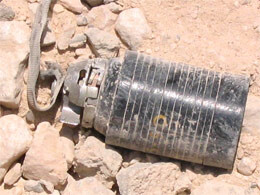Electronic Lebanon 7 June 2007

Unexploded ordnance lies beneath rubble in Nahr al-Bared refugee camp. (UNMACC)
“It is becoming extremely difficult to mount relief operations, not only because of the deteriorating security conditions, but also because debris, rubble and unexploded ordnance on the camp’s roads are obstructing the way for ambulances and relief vehicles,” said Jordi Raich Curco, the International Committee of the Red Cross (ICRC) head of delegation in Lebanon, in a statement.
A source inside the Lebanese Ministry of Defence, speaking on condition of anonymity, told IRIN that soldiers taking over buildings on the edge of Nahr al-Bared formerly held by Fatah Islam militants have found them booby-trapped.
The Palestine Red Crescent (PRC) remains the only emergency service entering the camp, both due to lack of security guarantees and because rubble and the winding alleys of the camp make access practical only for smaller vehicles.
First ICRC delivery in a week
The ICRC through the PRC on 7 June made its first delivery of water and food into the camp for a week, providing 800 litres of bottled water, one and half tones of bread and some fifty boxes of tinned tuna and soup.
The ICRC was loading a second convoy of six PRC ambulances this afternoon taking in further food supplies, as prioritised by the Palestinian Popular Committee, through whom the ICRC and PRC are accessing camp residents.
Since 3 June the PRC and Lebanese Red Cross have evacuated 72 vulnerable people from Nahr al-Bared, including pregnant women, children and the elderly. Only a few were injured.
US humanitarian, military aid
The US State Department said on 5 June it would provide US$3.5 million to the UN Agency for Palestinian Refugees (UNRWA), in response to an appeal for $12.7m to meet the humanitarian needs of over 27,000 Palestinians displaced from Nahr al-Bared.
US President George Bush also announced on 6 June that he was partially lifting a US ban on air traffic to Lebanon, in place since the 1985 hijacking of a TWA airliner to Beirut.
A memorandum released by the White House said Bush permitted “US air carriers under contract to the US government to engage in foreign air transportation to and from Lebanon — of passengers, including US and non-US citizens, and their accompanying baggage; of goods for humanitarian purposes; and of any other cargo or material.”
The US has dispatched several military cargo planes from its bases in the region to Beirut over the past two weeks carrying ammunition and other undisclosed equipment to re-supply the Lebanese army, part of a hugely increased $280m US military aid package to Lebanon.
UNRWA spokeswoman Hoda Samra told IRIN the agency had also received a pledge of 500,000 euros from Germany.
In the south, near the port city of Sidon, several hundred Palestinian refugees, who had fled Ain al-Helwe camp after clashes broke out on the night of 3 June between militants from Jund as-Sham and the Lebanese army, returned home on 6 June.
The army re-opened entrances leading to the Ain al-Helwe and Tawaree camps after a joint Palestinian security force — tasked with maintaining security and preventing Jund al-Sham attacking the army — was deployed around the outskirts of Ain al-Helwe, where Jund al-Sham is based.
This item comes to you via IRIN, a UN humanitarian news and information service, but may not necessarily reflect the views of the United Nations or its agencies. All IRIN material may be reposted or reprinted free-of-charge; refer to the copyright page for conditions of use. IRIN is a project of the UN Office for the Coordination of Humanitarian Affairs.
Related Links


